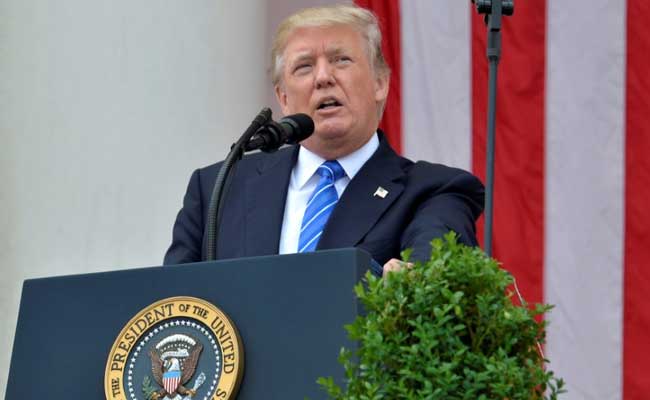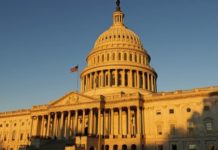
By Abby Smith
A study is forecasting trillions in global economic benefits from meeting Paris climate agreement temperature targets, but many of the corporate boardrooms most receptive to its conclusions are the ones already with ambitious climate goals.
The study, published May 24 in Nature, finds the globe could be more than $30 trillion richer if countries meet the 2015 climate deal’s strongest target, which aims to limit global warming to 1.5 degrees Celsius (2.7 degrees Fahrenheit).
The study is one of the first to look at the economic benefits of meeting the 1.5-degree goal in particular, compared to the agreement’s main target to limit warming to 2 degrees Celsius (3.6 degrees Fahrenheit).
The study of climate benefits and costs came nearly a year after President Donald Trump’s June 1, 2017, announcement that he would pull the U.S. out of the Paris climate deal, saying it imposed “draconian financial and economic burdens” on the nation.
Trump’s decision was the result of months of internal debate at the White House. But many U.S. companies, including oil and gas giants Exxon Mobil Corp. and Chevron Corp., urged the president to stay in the deal.
Still Split
Companies that are ambitious climate actors could see the study as further vindication they are doing the right thing in setting science-based emissions targets, procuring more renewable energy, and preparing for risks to their operations from climate change impacts such as sea level rise, Anne L. Kelly, senior director of policy for Ceres, the sustainability nonprofit group, told Bloomberg Environment.
Kelly directs Ceres’ Business for Innovative Climate and Energy Policy network, which includes companies such as Adobe Systems Inc., eBay Inc., General Mills Inc., IKEA, and Mars Inc.
Businesses on the sidelines aren’t likely to be swayed, in part because the research examines the potential economic benefits at a country level, making it difficult to distill down to specific companies, George David Banks, executive vice president at the American Council for Capital Formation in Washington, told Bloomberg Environment.
The paper is “useful from a very high-level policymaking perspective, but it’s not going to change the debate here in the U.S. on a national climate policy, and I don’t know how it can be used from a business perspective,” said Banks, who served as Trump’s top international energy adviser until February.
Projected Benefits
The Nature study, by Stanford University’s Marshall Burke, Noah S. Diffenbaugh, and W. Matthew Davis, projects economic benefits using gross domestic product for a range of scenarios. Those include if countries met the 1.5-degree or 2-degree Paris agreement targets; if countries achieved their current national emissions commitments, leading to about 2.5 or 3 degrees of warming by end of century; and business as usual, leading to up to 4 degrees of warming.
Although the study doesn’t measure the effect on individual companies, Burke said tucked within the broader GDP metric is the output of millions of individual companies that would be negatively affected by climate change in the absence of mitigation efforts.
Companies should see the potential benefit, too, of investments in new technology, he added. Meeting the 1.5-degree goal will require new technologies, and that is a big call to the private sector.
“The returns of those technologies are going to be absolutely huge,” Burke said.
According to the study, meeting the 1.5-degree target could increase global gross domestic product by 3 percent to 4 percent by 2100. That equates to around $30 trillion in current dollars, or about 20 percent to 30 percent of current global GDP, Burke told Bloomberg Environment.
The world’s poorest countries with already high temperatures would reap the biggest benefits from meeting the 1.5-degree target, but most large, wealthy nations also would see a substantial amount of avoided costs. The U.S. in particular could see potential economic benefits of $5 trillion to $6 trillion, Burke said.
Tipping Point
The Nature study runs counter to the narrative of the Trump administration and others who argue participation in the Paris agreement would be too costly for the U.S.
“There has been no change in the U.S. position on the Paris agreement,” Lindsay Walters, White House deputy press secretary, told Bloomberg Environment in response to questions about the study.
The recent Stanford University research isn’t the first report to show substantial economic benefits from aggressive climate mitigation.
That evidence is growing toward a tipping point, and it includes a 2017 study by the Organization for Economic Cooperation and Development that found short- and long-term economic benefits for Group of Twenty countries, representing major economies, from strong climate policies, Helen Mountford, program director for the New Climate Economy initiative, told Bloomberg Environment.
Mountford said the narrative pushed by critics that climate policy is too costly lingers, despite evidence to the contrary.
She finds that real-world evidence is more persuasive to companies—whether damages already incurred from climate effects or dollars earned from early investments in clean energy and other mitigation technologies.
Much of the business community is waking up to this, Mountford said.
Studies like the Stanford research should underscore not just the importance of calculating risks from climate change but also the significant benefit to be gained from learning where opportunities will lie and how to seize them, she added.
“Companies have done the math. They did the math a long time ago, regardless of who is in the White House,” Ceres’ Kelly said. Now those companies that already knew the clean energy transition would be cost effective know “there really will be value creation as well.”






